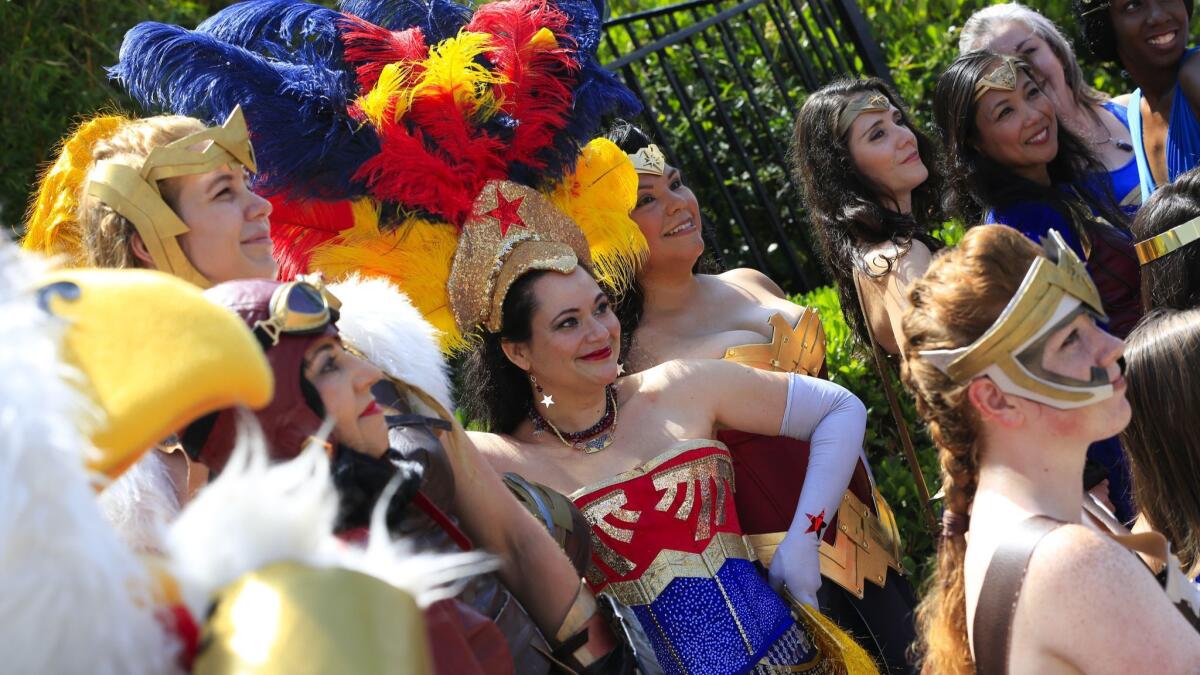Column: Can Comic-Con be a #MeToo superhero?

With an expected 130,000 people attending hundreds of panels over five action-packed days, this year’s Comic-Con International will be as massive as ever. But as repercussions from the #MeToo movement continue to rattle establishment cages from Hollywood to Washington, D.C., there will be less room at the San Diego Convention Center for sexual harassment — or allegations thereof — and gender inequality.
Take the recent case of longtime “nerd king,” TV host and Comic-Con favorite Chris Hardwick.
Late last week, actress Chloe Dykstra posted an online account of an emotionally abusive relationship with an unnamed man who closely resembled Hardwick, whom she dated for several years. Hardwick has denied all of the accusations made against him, but the pop-culture Powers That Be reacted with turbo-charged speed anyway.
The same day that Dykstra’s account was posted on the Medium website, Legendary Entertainment — which acquired the Nerdist Industries company that Hardwick co-founded — said it had removed all references to Hardwick pending further investigation.
The next day, AMC Networks — where Hardwick hosts the popular “Talking Dead” and “Talking with Chris Hardwick” shows — released a statement saying that while the network assesses the situation, “Talking with Chris Hardwick” would not be airing on AMC. Also, Hardwick said he would step aside from moderating the AMC and BBC America panels planned for Comic-Con.
Welcome to pop-culture’s complicated post #MeToo landscape, where media companies are making up for decades of inaction on the sexual-harassment front by dropping accused harassers like hot potatoes dipped in Kryptonite.
Four years after Comic-Con came under fire for not doing enough to prevent women in costume (“cos players”) from being harassed by fans, one of the Con’s most popular geeks is no longer welcome because of allegations of abusive behavior. What a difference the power of a hashtag makes.
“I was incredibly surprised by how quickly they dealt with this,” said Long Beach-based writer Rosie Knight, who creates and writes about comics and will be leading “Comics Are for Everyone … Aren’t They?,” a Comic-Con panel on making comics more accessible to a broader range of creators and fans.
“I have never known programming to be pulled from Comic-Con because of accusations of abuse. I think this shows that nerd culture is being held accountable. This sends a pretty strong message that this kind of behavior is not OK.”
If you have ever attended Comic-Con, then you know that the perception of the convention as the epicenter of white fan-boy culture is not the reality. Comic-Con attendees come in all sizes, ages and colors. And a huge portion of these fans are fan girls and fan women.
They come to Comic-Con to celebrate kick-butt stars like Charlize Theron in “Atomic Blonde.” They come to hear from female directors, editors and production designers. They come to hear from women who are bringing feminism to film, television and comic books.
So the news that the beloved Hardwick was losing his Con cred because of abuse allegations was less a #MeToo bolt out of the Comic-Con blue than a reflection of the empowering spirit that is increasingly become part of the Con formula.
“I am seeing a lot more panels about empowerment and representation,” said Janina Scarlet, a San Diego-based licensed clinical psychologist who has participated in multiple Comic-Con panels, including talks on the ways heroic comics, movies and toys can help people deal with bullying and trauma.
“It used to be the case that out of hundreds of panels, there would be one panel on feminism or diversity, and now there are dozens. It is a place where everyone can come together to celebrate their similarities as well as their differences.”
After Geeks for CONsent circulated a petition in 2014 asking for Comic-Con to take a zero-tolerance stance on harassment, Comic-Con has been more aggressive about making sure the public knows about its Code of Conduct, which states that “Harassing or offensive behavior will not be tolerated,” and that Comic-Con reserves the right to revoke the membership and badge of anyone not in compliance.
But Comic-Con’s most effective tool against harassment might be the power of its people. Fans have always been the heart of Comic-Con, and fans will be the ones who will keep it from going to the dark side.
“What I am seeing is more people are responding and reacting to fan-boy culture as far as calling out the bullies and supporting the people being targeted,” Scarlet said. “I think what the #MeToo movement demonstrated is that there is power in numbers. If we speak out and connect with other people, we are more likely to make a difference than if we suffer in silence.”
Twitter: @karla_peterson

